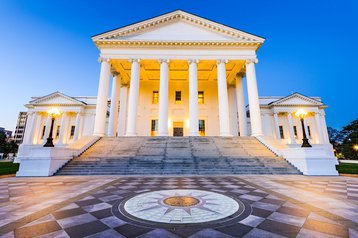Northern Virginia is the Mount Olympia of the data center world. With the largest proportion of data centers in every North American region, it has become somewhat synonymous with our industry.
But because of this popularity, in recent years it has become increasingly difficult to access land for new developments.
In part this is due to a sheer lack of space – if you keep building massive campuses in one area, eventually you run out of viable land. But it is also due to the massive energy consumption in the area, and the general upset our sprawling industry is causing the local residents.
In a recent DCD>Talk with Digital Realty’s Rich Hallahan, we talked with the major provider about its experience operating in this difficult market. Somewhat surprisingly, Hallahan was quite optimistic.
“The first word that jumped into my head, as weird as this might sound, is that it's easy in the sense that everybody has a presence here,” said Hallahan. “Whether it's an engineering firm or a supplier when you’re trying to get things done, your resources are here.”
This being said, Hallahan did concede that it certainly helps that when he picks up the phone to ask for help, he has the power of Digital Realty behind him.
Regardless, Hallahan thinks that the concentration of the data center industry in Virginia, overall, is an asset.
“The data center industry as a whole is small, and when you bring it down to the community level within Ashburn, it's even smaller and tighter,” he said.
But while there may be a high concentration of skill and sector-based knowledge, Northern Virginia is facing some opposition from the local community. In November last year, residents in Alexandria, Virginia, protested a new data center development, claiming that it would have a negative impact on the community with noise and light pollution at all hours of the day, using lots of local resources, and being a general eye sore.
Hallahan does not deny the negative response data centers sometimes receive.
“I'm tied into some of the local community forums, and so you see, every so often somebody would post ‘Why do we have so many data centers here? They're so ugly, blah, blah, blah.”
But Hallahan says that while some protest, others appreciate the facilities.
“There’s a segment of the community that doesn't get it, but some do, and then you see the responses and they say that there's a lot of tax revenue coming from those data centers. There's a lot of infrastructure that's being put into place, there are fewer cars and less traffic because of the data centers, and you don't have 1,000s of people commuting through your community,” Hallahan argued.
Digital Realty, in particular, is making an effort to embed its data centers into the environment in a less obnoxious way, whether that is including landscaping or making more of an effort to make the buildings aesthetically pleasing.
The company is also taking its sustainability seriously, making sure that it has a clear paper trail for its efforts.
“To a certain extent, Digital has always tried to be a good steward at the facility level,” said Hallahan. “Obviously, if you're driving greater efficiency, in how your facility operates, you're trying to by default use fewer resources, whether it's less power or whatever.”
But according to Hallahan, the key is to approach sustainability on a case-by-case basis. ‘All politics is local,’ and so Digital Realty tries to make sure that it is building in a way that is meeting the needs of the local area.
While 2022 saw massive growth in Northern Virginia, the consensus seems to be that while it is still a key hub for the industry, construction will slow down in the coming years. To find out more about the data center industry in Northern Virginia according to Digital Realty, watch the full DCD>Talk here.




